Many Forms of Co-operation between the University of Turku and Brazil
From 10th to 14th November 2014, the University of Turku is taking part in a delegation to Recife, situated in the state of Pernambuco, Brazil. The trip is related to the operation of Intercity Collaboration of South West Coast of Finland (LOURA) with the objective to increase co-operation between the two areas.
One of the main events of this week, the Tour of Brazil event devoted to Blue Growth, gathered more than 100 participants from different organisations to introduce projects, plans, policies and co-operation possibilities on research, science and innovation related to Blue Growth, with the focus on how new technologies can put marine resources to productive use and create sustainable growth and jobs, while at the same ensuring that these resources can be enjoyed by future generations.
The Tour of Brazil concept is a joint initiative of the European Union Member States, Associated Countries to Horizon 2020 and the European Commission, with the objectives to increase the visibility of European research and innovation programmes, to make the European science, technology and innovation landscape known to Brazilian partners, and to foster new co-operation between the Brazilian and European research communities and companies. The event in Recife was organised jointly by the Secretariat of Science and Technology of the State of Pernambuco (SECTEC), the LOURA network, the Finnish Ministry of Education and Culture and the Embassy of Finland in Brazil.
REBUS Programme and Maritime Industry
One of the participants of the delegation in Recife is Development Manager Antti Saurama from Turku School of Economics. Saurama, who has long been involved in co-operation with Brazil, is the head of a project that focuses on examining future business models and service oriented operating logic in industrial value chains, particularly in the maritime industry. The project is part of the REBUS research programme of FIMECC Oy. The objective of REBUS is to renew business models of Finnish machine, metal and technology industry enterprises in networks and international ecosystems. An important partner in the project is the Federal University of Pernambuco. One of the goals of the visit to Pernambuco is to strengthen and increase academic co-operation.
‒ We have had joint research projects with Brazil for two years and REBUS will be continuing until the end of 2018. The collaboration has included, for instance, research on the settling of Finnish small and medium-sized maritime industry enterprises in Brazil, says Saurama and emphasises that the collaboration between the University of Turku and the Federal University of Pernambuco involves concrete action, not merely discussion and planning.
Research on Luminescent Materials and Solar Energy
Also many other researchers at the University of Turku have solid contacts to Brazil. University Lecturer Mika Lastusaari from the Department of Chemistry and PhD student Hellen Santos from the University of São Paolo are involved in a research project concerning the harvesting and storing of solar energy and the study of luminescent materials. One of their goals is to develop more efficient solar cells. The project has funding from the Academy of Finland and CNPq (Conselho Nacional de Desenvolvimento Científico e Tecnológico i.e. the National Council for Scientific and Technological Development) in Brazil.
‒ On a general level, the co-operation has already been very fruitful. We have had very good scientists visiting and invaluable co-operation, and we have been getting expertise and equipment from their part, says Lastusaari.
According to Lastusaari, the co-operation between the group of inorganic materials chemistry of the University of Turku and Brazil was started already before the current project by Professor Emeritus Jorma Hölsä, with a project not focused on solar energy. Collaboration will also continue in the future. ‒ We have another funding application at the moment. The research will be a natural continuation for the current study.
‒ This kind of collaboration is really important, says Santos. She also points out that PhD students who conduct research in other countries can, upon their return, bring back with them useful information about methods used in the hosting country and this information can be utilised to improve the methods used in their home country.
Study on Amazonian Forests
Lecturer Hanna Tuomisto from the Department of Biology leads the Amazon Research Team, which has long-standing contacts with several Amazonian countries, including Brazil. The team's geologists collaborated with Brazilian colleagues already in the 1990's. Tuomisto started her research in the western Amazonian countries, and made her first trip to Brazil in 2008.
‒ Much of the team's research focuses on documenting how plant and animal species composition and diversity varies across Amazonian rain forests, and what ecological and historical factors cause that variation. We also study how the high species diversity has evolved. These general projects have been going on for a long time in different areas and by different people, says Tuomisto.
Tuomisto's main collaboration partner in Brazil has been INPA (the National Institute of Amazonian Research), but her most recent research project is carried out together with INPE (the National Institute for Space Research). This project started in the beginning of 2014 and is funded jointly by the Academy of Finland and the Brazilian FAPESP (Foundation for Research Support of the State of São Paulo). Tuomisto also has contacts to other Brazilian institutions, as do many of the other members of the Amazon Team.
Tuomisto is impressed with the high quality of university education and research in Brazil. This makes collaboration both fruitful and exciting.
‒ The Brazilian students I know have a very good knowledge of their field, and they are highly motivated. Two of my former field assistants from Brazil are now carrying out doctoral studies in Turku, and they are doing very well, says Tuomisto. Currently there is a massive internationalisation programme in Brazil called Science without Borders. We have already hosted several doctoral students through this programme, and are looking forward to have more in the future.